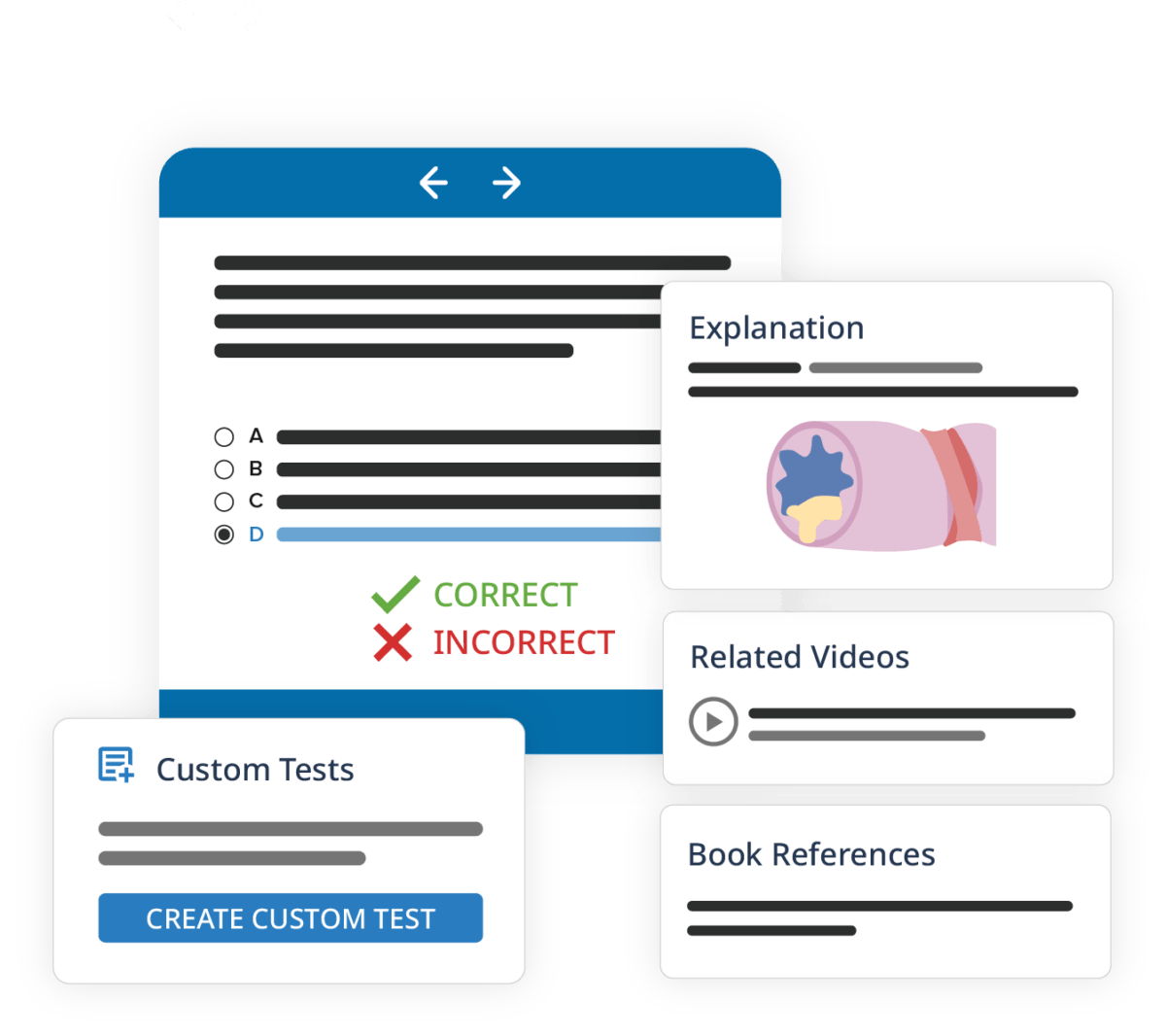Caring for cardiac patients comes with special considerations. You’ll want to be aware of different cardiac conditions as well as the best nursing practices for cardiac patients.
Practice questions are an essential way to study for NCLEX, but you also want to make sure to brush up on the actual subject matter and study specific conditions and treatments.

Today, I will break down two different NCLEX questions that are related to heart disease and share the correct and incorrect answers and explanations.
Question 1
The nurse is admitting a client who reports crushing chest pain and is diaphoretic. Upon interview, which question is the most important for the nurse to ask?
Answers:
A. “Do you have a smoking history?”
B. “When did the pain start?”
C. “Is there any family history of heart disease?”
D. “Can you tell me what medications are you taking?”
Before we delve into the correct and incorrect answers, let’s take a minute to consider the best approach to answering this question. It’s good to read the question in detail and look over each individual answer option first. Make sure you fully understand the question itself. For example, crushing chest pain could be a medical emergency, and do you understand what diaphoretic means?
While reading the answer options, consider how each one might contribute to this situation. As you read the question and answer options, ask yourself:
- Which answers are relevant to the patient’s situation?
- Do any of these answers take patient safety into consideration?
- What is the most pressing question to answer at this time?
Answer A: “Do you have a smoking history?”
This is a common question to ask a patient during admission, however, it would not be the most important thing to ask them at this moment. This answer is not correct. When assessing a patient upon admission, you will typically ask them a variety of different questions about their health history. Knowing if your patient is a smoker or not can help in determining what types of health issues they’re facing and the causes.
Answer B: “When did the pain start?”
It is essential for the nurse to find out how long the pain has lasted, because if it is due to a myocardial infarction (or heart attack), the patient is at risk of irreversible tissue damage. After four hours, tissue may be beyond salvage, so blood flow needs to be restored before four hours have gone by. This is the correct answer.
Answer C: “Is there any family history of heart disease?”
Although this is important information to gather, it is not the correct answer. There is more pressing information that needs to be gathered before the nurse finds out about the patient’s history.
Answer D: “Can you tell me what medications are you taking?”
This is also useful information to gather, but it is still not considered the “most right” answer.
Understanding the concept of the “most right” answer
One of the most tricky aspects of the NCLEX is the fact that there is rarely just one correct answer option. This means you have to be able to figure out which answer is the “most right.” In order to find the “most right” answer, you have to take your time and read through every answer.
You also have to consider patient safety and what type of information is the most essential to gather based on the specific situation you’re dealing with. For this question, the right answer was the only answer that actually asked about the pain itself. Because the main issue with this patient is their chest pain, it is vital for the nurse to gather information about the pain.
Some other questions that may also be asked relating to the pain include:
- How severe does the pain feel on a scale of 1 to 10?
- How would you describe the pain (burning, throbbing, sharp, dull, aching, etc.)?
- Where is the pain located? Does it radiate (or spread to other areas)?
Question 2
The nurse assesses clients diagnosed with coronary heart disease. Which client does the nurse associate with a potential risk for complications?
A. HR 66 beats/min
B. BP 120/78 mm Hg
C. Ejection fraction of 45%
D. Cardiac output of 6.0 L/min
Answer A: HR 66 beats/min
A normal adult heart rate ranges from 60 to 100 beats per minute. Therefore, a heart rate of 66 beats per minute is considered normal. For this reason, this answer is not correct. If the client has a normal heart rate, it wouldn’t make sense for the nurse to consider them to be at risk for complications.
Answer B: BP 120/78 mm Hg
120/78 is a normal finding for adult blood pressure, so this answer is not correct.
Answer C: Ejection fraction of 45%
The ejection fraction of the heart measures how well your heart can pump oxygen-rich blood to the rest of the body. A normal ejection fraction is one that is 55% or higher. For this reason, an ejection fraction of 45% is not considered normal and does show some cause for concern. By knowing that this is an abnormal finding, you can reach the conclusion that this is the correct answer.
Ejection fractions are measured during an echocardiogram which assesses the function of the heart structures using sound waves. By being aware of what a normal ejection fraction is, you can determine that this is an abnormal finding and recognize that this patient does show some risk for cardiac complications. A low ejection fraction might indicate more serious conditions such as heart failure.
Answer D: Cardiac output of 6.0 L/min
Your cardiac output is the amount of blood pumped by the heart each minute. A normal cardiac output is 4–8 liters per minute. Because 6 liters per minute for cardiac output is considered a normal finding, this answer is not correct.
My approach to answering Question 2
Answering question 2 correctly really came down to having an understanding of heart health and what types of parameters are considered normal. Knowing a normal heart rate and blood pressure is pretty basic nursing knowledge, but once you start talking about ejection fraction and cardiac output, it may be a little harder to remember what normal measurements are.
For this reason, you should make sure to study these types of clinical measurements in order to know what is considered normal and what isn’t. This is where it is important to keep in mind that practice questions are important but you also have to have general knowledge such as lab values, common medications, and vital sign measurements.
Tips for Answering Cardiac Questions on NCLEX
When you face the inevitable cardiac-related questions on NCLEX, you’ll be glad you took some extra time to prepare. Below, I’ve listed some general tips to help you best prepare to answer cardiac questions on the NCLEX.
Review some of the most common cardiac conditions
If you come across an NCLEX question and you don’t even know what the condition is that you’re being asked about, it will be hard to answer the question correctly! For this reason, you should make sure to study up on as many common cardiac conditions as possible such as:
- Hypertension
- Coronary artery disease
- Angina
- Pericarditis
- Myocardial infarction
- Heart failure
- Cardiomyopathy
- Dysrhythmias.
Be aware of normal parameters for cardiac patients
As you saw above with the example questions, you need to know what normal vital sign measurements are for cardiac patients, such as:
- Blood pressure
- Heart rate
- Cardiac output
- Ejection fraction
- Stroke volume
Know what conditions warrant swift intervention
One of the examples above asked about chest pain. This is a condition that warrants immediate intervention since it can cause permanent damage if not dealt with quickly. Heart attack or myocardial infarction is one of the most common types of cardiac emergencies. Other examples include:
- Cardiac arrest
- Ventricular fibrillation (v-fib)
- Unstable angina (or chest pain)
Be aware of lab values related to heart health
Important lab values that are related to heart health include cholesterol, myoglobin, CK-MB, and troponin.
Know about common treatment approaches for heart conditions
What interventions are usually used for chest pain, heart failure, or irregular heartbeats? It is important to be aware of what these interventions are in order to best answer cardiac NCLEX questions.
This is only a general overview of what to know about the heart before going into the NCLEX. Always follow the guidance of your nursing instructors and that of any NCLEX prep courses you decide to take before you sit for your boards.
Takeaways
Let’s be honest, there’s a really good chance that you’ll see some questions on NCLEX that you weren’t prepared for. After all, there is no way to really know what you’ll be asked. But you can do your best to prepare by doing plenty of practice questions and becoming well-versed in common conditions such as heart disease.





